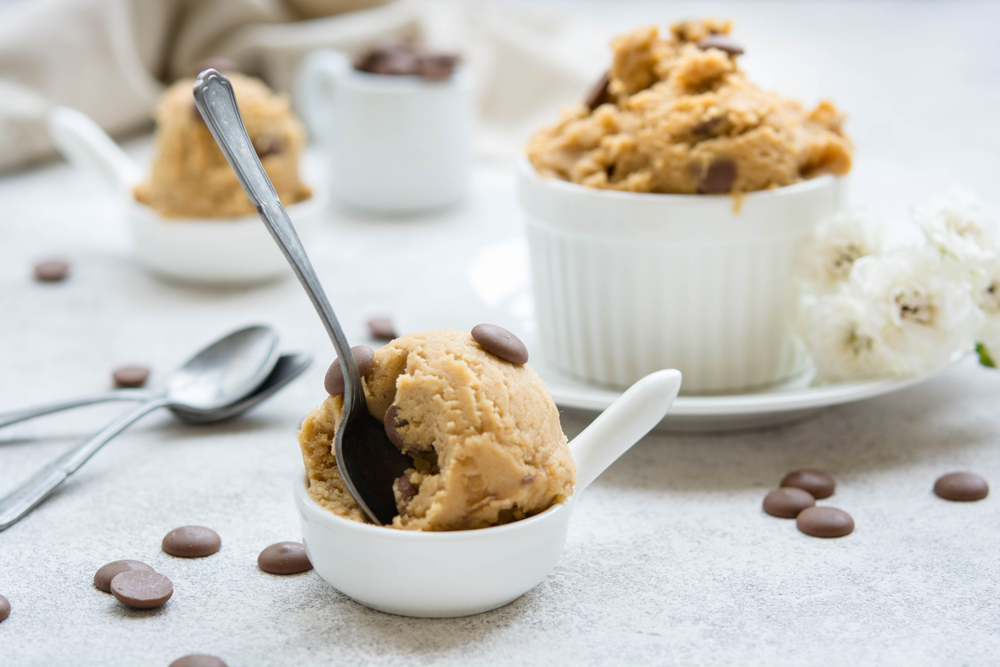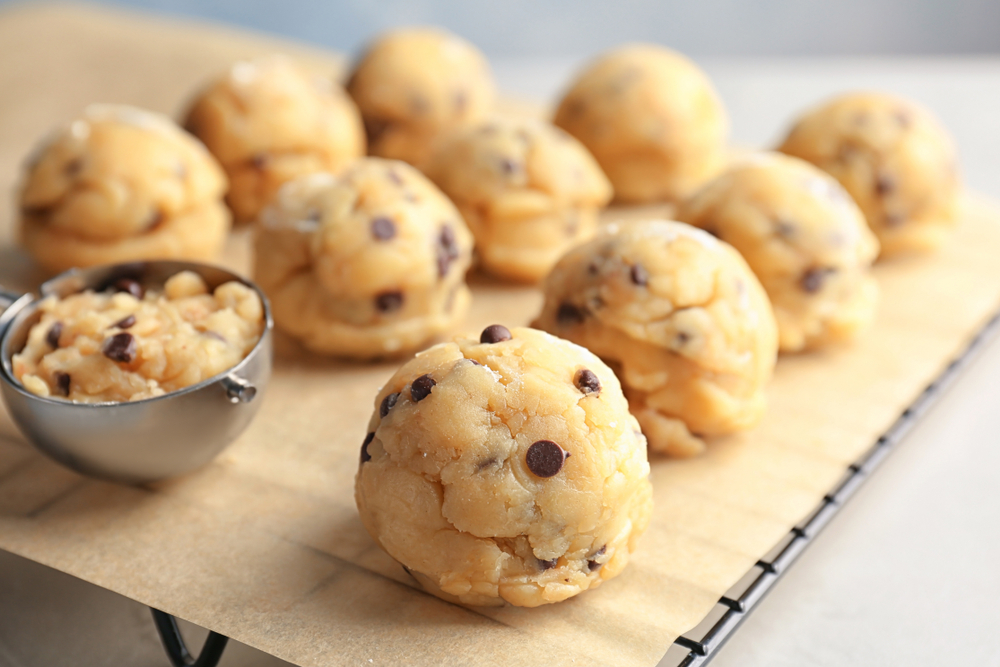Whether homemade or store-bought, such as Pillsbury cookie dough, chocolate chip cookies are one of the easiest desserts to pop in the oven. But does it go bad, or is this a pre-made treat you can store away for ages?
In short, yes, raw cookie dough can become unsafe to eat. But the amount of time it takes to go bad depends on several factors. The ingredients, storage method, and whether it’s homemade or pre-packaged can all affect the longevity of cookie dough.

While it May Still Look Delicious, Cookie Dough That Has Gone Bad Can Make You Very Sick
Eating spoiled food can make people seriously ill. And when there are so many factors that can affect the safety of cookie dough, knowing whether to toss it or use it can get pretty confusing.
It is important to be cognizant of food safety when it comes to putting together your favorite cookie recipe.
Before using any cookie dough, you should check it first to ensure it hasn’t spoiled. Here are a few red flags to watch out for:
If you notice any of these signs in your cookie dough, you should avoid using it. At best, it will result in some bad-tasting cookies, and at worst, it could make you very ill.
There are often several factors at play when cookie dough goes bad.
The first thing that happens to cookie dough over time is oxidation, which is what happens when the dough gets too much exposure to air. Oxidation will cause the dough to dry out and result in a poor-tasting cookie. While oxidation is not inherently dangerous, it is still a good enough reason to toss your cookie dough in the trash.
Another way cookie dough goes bad is when bacteria begin to grow on it. A common bacteria that grows on expired food is E. coli. Staphylococcus aureus, or staph for short, can also grow on your cookie dough when it starts to spoil. Both of these bacteria can make you seriously ill.
Over time, cookie dough can begin to grow mold as well. Mold spores can grow even when you keep your cookie dough in a tightly-sealed container.
When mold grows on food, it thoroughly contaminates it-even the parts that aren’t visibly moldy. So while it may feel tempting to scrape the mold off your old cookie dough, doing this will not make it any safer to eat.
The shelf life of cookie dough will vary depending on a few factors. For the sake of safety, use your best judgment when using cookie dough and dispose of it if there is any doubt.
For the best results, use homemade cookie dough between two and four days after you’ve prepared it. Once that time has passed, the safety and quality of your made-from-scratch cookie mix will begin to deteriorate.
If you’re storing your homemade cookie dough in the freezer, however, it can last for up to two months.
You should also consider the ingredients you put in your cookie dough. While the dry ingredients like flour, brown sugar, and baking powder may all last for quite a bit of time in your cupboard before expiring, this is not the case with many dairy products. A raw egg or butter will eventually go bad. The problem becomes more pronounced if you used eggs or butter close to their expiration date, your cookie dough may spoil much more quickly due to the egg or butter being nearly expired.
Store-bought cookie dough tends to last a bit longer than homemade. This is because it can often contain preservatives such as BHA (butylated hydroxyanisole) and BHT (butylated hydroxytoluene).
Most store-bought cookie dough comes with an expiration date on the package. So if you want the best quality for your cookies, you should try to use it before that date. Even edible cookie dough has an expiration date eventually though it may be more resilient than raw cookie dough you made yourself.
Do you want to make the most of your cookie dough before it spoils? Here are a few tips you can follow to help it stay as fresh as possible.
While storing food in the fridge can keep it fresh for longer, it doesn’t stop spoilage altogether. It takes a mere few days for homemade cookie dough to spoil when it’s in the fridge.
To help ensure that your cookie dough lasts as long as possible, check that your refrigerator is at the right temperature. You should also store your cookie dough in an air-tight container to keep it from drying out.
Amanda from Amanda's Favorite's giving tips on freezing cookie dough
Cookie dough typically will not spoil as long as it is in the freezer - this is because low temperatures prevent illness-causing bacteria from growing on food. However, this is only true if your cookie has not already begun to spoil before you put it in the freezer. And while cookie dough may not spoil in the freezer, it can still lose its quality.
Over time, frozen cookie dough can get freezer burn - this results in dry cookie dough with an unpleasant flavor. While it most likely won’t make you sick, it is still best to throw out your frozen dough once it has been in the freezer for more than three months.
Because raw cookie dough is a perishable food, you should never leave it out on the counter for more than two hours. This food is particularly prone to growing bacteria because of the raw eggs and dairy in it. As a result, leaving cookie dough out at room temperature will enable those bacteria to thrive.
Eating raw dough that has sat at room temperature for too long can cause serious illness. Bacteria such as E. coli, salmonella, and even botulism can grow on cookie dough if you do not promptly refrigerate or freeze it.
The “danger zone” refers to a temperature at which food is most likely to spoil - this is anywhere between 41 and 135 degrees Fahrenheit. So if you want to keep your cookie dough from spoiling, you should store it well below this temperature range.
Many foods are completely safe to eat well after their expiration dates-but what about cookie dough?
With pre-packaged cookie dough, some say that you can often eat it long after the expiration date-sometimes up to two months. This is not advised. The risk certainly isn’t worth it.

Expired Cookie Dough May Last a Bit Past the “Best By” Date - But it Probably Isn’t Worth the Risk
Even with cookie dough that hasn’t expired, be sure to examine it for signs of spoilage before using it. Sometimes errors in packaging or storage can cause spoilage issues. You should also cook it thoroughly to reduce the risk of foodborne illness.
Once cookie dough begins to show signs of spoilage you should not attempt to use it. Using cookie dough past its prime can lead to illness. In children or people with compromised immune systems, foodborne illness can be very severe.
In general, if you’re unsure about the safety of eating expired cookie dough, you should simply throw it out. It is better to waste food than make yourself or someone else sick.

If Your Cookie Dough Has Gone Bad, Throw it Away. Baking Cookies Won’t Eliminate all Bacteria and Potential Toxins.
What to do if You’ve Eaten Spoiled Cookie Dough
Have you eaten cookie dough that’s expired? Here are the next steps you should take.
Many people will not get sick after eating spoiled cookie dough. But if you do get sick, you will likely begin showing symptoms between six and twenty-four hours after consuming it.
If that time frame has passed and you have not gotten sick, it might mean there weren’t enough bacteria in the cookie dough to make you ill.
We’ve talked about cookie dough going bad, but what about other types of dough - like pizza dough or sour bread dough?
Overall, it’s safe to use the same guidelines with cookie dough as you would with other types of dough. Any kind of uncooked dough has the potential to spoil and cause foodborne illness. Most types of dough will have the same shelf life, too, so you should make sure to use them promptly.
Freezing other types of dough can extend their shelf life, and refrigerating them is essential for long-term storage.
You should also never use any kind of dough that has signs of spoilage such as discoloration, an unusual smell, or mold.
Do you think your chocolate chip cookie dough may have gone bad? If so, the best thing you can do is dispose of bad cookie dough immediately to avoid accidental food poisoning. You should also take the trash outside as soon as possible to keep any unpleasant smells out of your home.
If you stored your cookie dough in an airtight container, make sure to clean the container thoroughly to remove any bacteria. Use hot, soapy water and wear gloves. You can also use a diluted bleach solution if you want to be extra thorough.
No - or at least not enough to make the cookie dough safe. While cooking can kill a lot of different bacterias, it may not kill all the bacteria that grows on spoiled food. Many types of bacteria, such as botulism, can create heat-resistant toxins. So, unfortunately, even a baked cookie can be a vector for foodborne illness.
